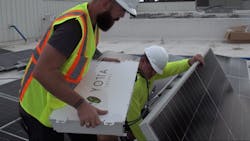Yotta Energy raises investment tally to $16.5M to scale up Solar plus Storage solutions for C&I, Military customers
C&I energy storage technology firm Yotta Energy has gained $1.97 million in funding to build a new solar plus storage microgrid at Nellis Air Force Base in Las Vegas.
The award from ESTCP was announced along with another $3.5 million raised through a strategic investment by inverter OEM partner APsystems. Overall it brings Yotta Energy’s total Series A investment to $16.5 million.
"We see tremendous growth potential in rooftop solar-plus-storage, but much more than that, Yotta has produced an innovative, module-level commercial energy storage solution that no one else is doing right now,” said Olivier Jacques, APsystems president of global business units. “During our time working with Yotta, we have seen firsthand the positive disruption they are making in the industry. No zoning, no concrete, and efficient energy storage direct to DC."
With this funding, Yotta plans to accelerate the scaling of its panel-level solar plus storage system and increase its workforce.
Yotta previously partnered with APsystems to develop the company’s Duel Power Inverter conversion system designed to be interchangeable between solar and storage. Yotta and APsystems are also collaborating on the development of a 480-volt, 3-phase, microinverter to scale and compete with string inverters in C&I applications.
"As the rooftop solar-plus-storage market continues to grow rapidly, there is a severe shortage of technology that can help C&I buildings efficiently distribute and decentralize the energy generated by solar energy," said Omeed Badkoobeh, CEO and Co-founder of Yotta Energy. "With electric vehicle adoption also expanding, the need for businesses to produce their own electricity will only become more prudent.”
Last year, Yotta Energy raised $13 million in capital from investors WIND Ventures, Doral Energy-Tech Ventures, Riverstone Ventures, EDP Ventures and SWAN Impact Network. The earlier funding allowed Yotta to accelerate installation of its PV-coupled solar plus storage solutions for flat-roof energy backup.
-- -- --
(Rod Walton, senior editor for EnergyTech, is a 14-year veteran of covering the energy industry both as a newspaper and trade journalist. He can be reached at [email protected]).
About the Author
Rod Walton, EnergyTech Managing Editor
Managing Editor
For EnergyTech editorial inquiries, please contact Managing Editor Rod Walton at [email protected].
Rod Walton has spent 17 years covering the energy industry as a newspaper and trade journalist. He formerly was energy writer and business editor at the Tulsa World. Later, he spent six years covering the electricity power sector for Pennwell and Clarion Events. He joined Endeavor and EnergyTech in November 2021.
Walton earned his Bachelors degree in journalism from the University of Oklahoma. His career stops include the Moore American, Bartlesville Examiner-Enterprise, Wagoner Tribune and Tulsa World.
EnergyTech is focused on the mission critical and large-scale energy users and their sustainability and resiliency goals. These include the commercial and industrial sectors, as well as the military, universities, data centers and microgrids. The C&I sectors together account for close to 30 percent of greenhouse gas emissions in the U.S.
He was named Managing Editor for Microgrid Knowledge and EnergyTech starting July 1, 2023
Many large-scale energy users such as Fortune 500 companies, and mission-critical users such as military bases, universities, healthcare facilities, public safety and data centers, shifting their energy priorities to reach net-zero carbon goals within the coming decades. These include plans for renewable energy power purchase agreements, but also on-site resiliency projects such as microgrids, combined heat and power, rooftop solar, energy storage, digitalization and building efficiency upgrades.

